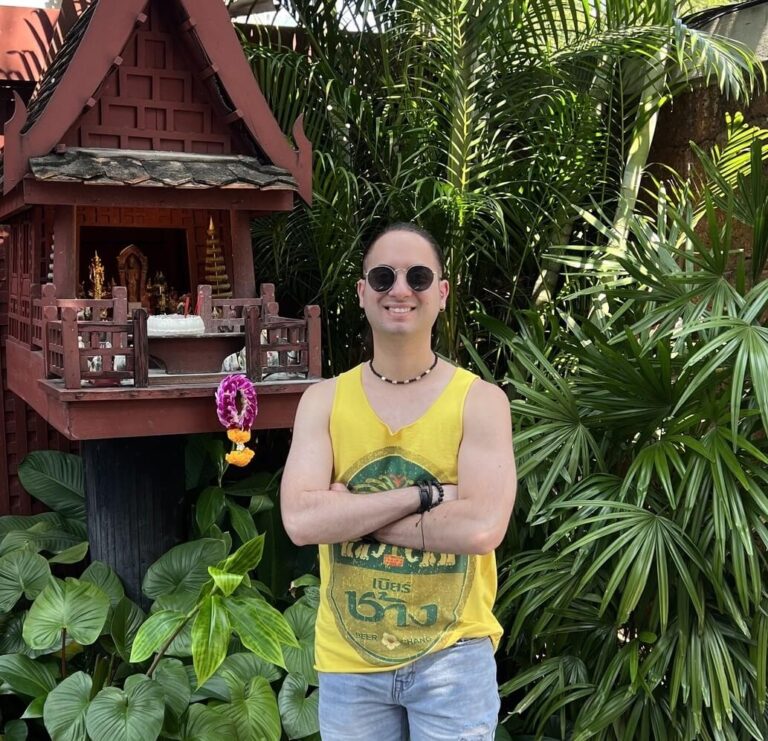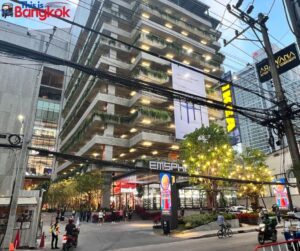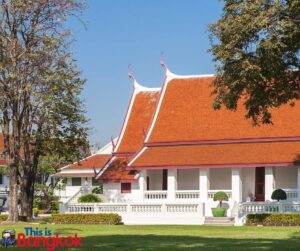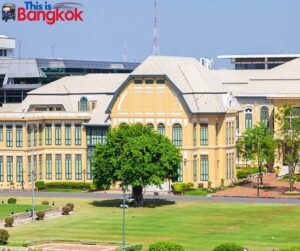Welcome, dear wanderer! Brace yourself, for we’re about to embark on the thrilling roller coaster ride of “Currency, Money & Tipping in Bangkok” – the guide so necessary it might as well be considered a tourist attraction itself!
You might be an experienced jet-setter or someone who still thinks ‘Baht’ is a sound you make when cold.
No judgment! Either way, buckle up.
By the end of this journey, you’ll be navigating the monetary maze of Thailand’s buzzing capital like a pro.

The Currency & Money in Bangkok
The currency used in Bangkok, Thailand, is the Thai Baht (THB), the country’s official currency.
The Thai Baht is abbreviated as “฿” or sometimes simply as “B.”
Thai Baht banknotes come in various denominations, including 20, 50, 100, 500, and 1000 Baht.
Each denomination typically features a portrait of a notable Thai figure on the front and images of important landmarks, cultural symbols, or scenes from Thai history on the reverse side.
The coins are issued in 1, 2, 5, and 10 Baht denominations.
The front side of these coins generally features an image of the current monarch, King Maha Vajiralongkorn, while the back depicts various symbols, images, or emblems of Thailand.
| Currency | Exchange Rate (THB) |
|---|---|
| USD | |
| EUR | |
| JPY |
ATMs
ATMs are widely available throughout Bangkok and are a convenient way to withdraw Thai Baht using your debit or credit card.
Most ATMs allow you to select English as the language for the transaction.
However, you must know of any potential foreign transaction fees your bank may charge.
It’s a good idea to carry some cash, particularly in smaller towns or local markets, where cash might be the preferred form of payment.
Exchange rates in Bangkok
Exchange rates between the Thai Baht and other currencies can fluctuate, so checking current rates before travel is advisable.
Banks, exchange booths, and some hotels offer currency exchange services.
Be cautious when exchanging money at street vendors or unlicensed exchange booths to avoid potential scams.
When exchanging money, you should do so at authorized exchange booths or banks to ensure you receive a fair rate.
Avoid exchanging money with street vendors or unofficial sources, as this can expose you to potential scams or unfavorable rates.
Credit Cards
Credit cards are widely accepted in larger establishments, hotels, restaurants, and shopping malls in Bangkok.
Visa and MasterCard are the most commonly accepted card networks.
However, cash is often preferred in smaller markets, local shops, or more rural areas.
Cash vs. Card
While credit and debit cards are commonly accepted, carrying cash is a good idea, especially when visiting local markets, street vendors, or smaller businesses.
Some places may not accept cards or have a minimum spending requirement for card transactions.
Tipping
Tipping is not as common in Thailand as in some other countries.
However, upscale restaurants and hotels may add a service charge to the bill.
If a service charge is not included, leaving a small tip is appreciated but not mandatory.
Leaving a tip in a spa and a Thai massage is much appreciated, and you will notice the staff is waiting for the tip, so don’t forget to give them because it’s challenging work, and usually, they live from the tips.
A 50 to 100 Baht tip is recommended for spa services.
FAQ
Here are some frequently asked questions about currency, money, and tipping in Bangkok:
What is Bangkok money called?
Bangkok’s currency is called Thai Baht (THB).
How much Baht is 1 USD in Bangkok?
Exchange rates vary, but roughly 1 USD equals around 30-35 THB in Bangkok.
What is the best currency to use in Bangkok?
Thai Baht (THB) is the best currency to use in Bangkok.
Is 1000 baht a day enough for Thailand?
1000 baht a day might be tight, but it can cover basic expenses in Thailand.
What money should I take to Thailand?
Bring Thai Baht (THB) for convenience, but you can also carry USD and exchange it locally.
Do I need cash in Bangkok?
While cards are widely accepted, having cash (Thai Baht) for small purchases is advisable.
Is $1000 enough for two weeks in Thailand?
$1000 for two weeks in Thailand might be minimal; consider a higher budget.
How much money do I need for 10 days in Thailand?
Around 10,000 to 20,000 Baht should cover basic expenses for 10 days in Thailand.
How much money should I take to Thailand for 2 weeks?
For a comfortable two-week trip, aim for 20,000 to 40,000 Baht.
Is 5000 baht enough?
5000 baht can cover daily expenses but might be tight for longer stays or significant activities.
Should I carry cash to Thailand?
Carrying cash (Thai Baht) is advisable, especially in rural areas and local markets.
How much money do I need for 4 days in Bangkok?
Around 4000 to 8000 Baht should suffice for 4 days in Bangkok.
Is 1000 enough for 10 days in Thailand?
1000 baht a day might not be enough for a comfortable 10-day stay.
Is 20000 baht enough for 5 days?
20000 baht can cover expenses for a 5-day stay, depending on your activities.
Is Bangkok cheap or expensive?
Bangkok can be cheap and expensive, depending on your choices and preferences.
Can we use USD in Thailand?
While some places accept USD, using Thai Baht for better rates is better.
How much cash can I take into Thailand?
You can bring up to 20,000 USD or equivalent without declaring it.
Is it better to exchange money in Bangkok?
Exchanging money in Bangkok generally offers competitive rates.
Is 20000 Baht enough for a week?
20,000 Baht can cover basic expenses for a week in Thailand.
Should I exchange money before Thailand?
Exchanging some money before Thailand can be convenient, but you’ll find better rates in-country.
In conclusion
Bangkok is a vibrant, bustling city where Thai Baht is the preferred currency.
Credit and debit cards are widely accepted, although carrying some cash can come in handy.
Exchange rates vary, so check for current rates when exchanging money.
Tipping is not mandatory but appreciated in certain establishments. Knowing how much you need before going on your trip is advisable.
With some preparation, you can relax and enjoy the sights while enjoying all that Bangkok offers.
And don’t forget to bring some souvenirs back for friends and relatives!












